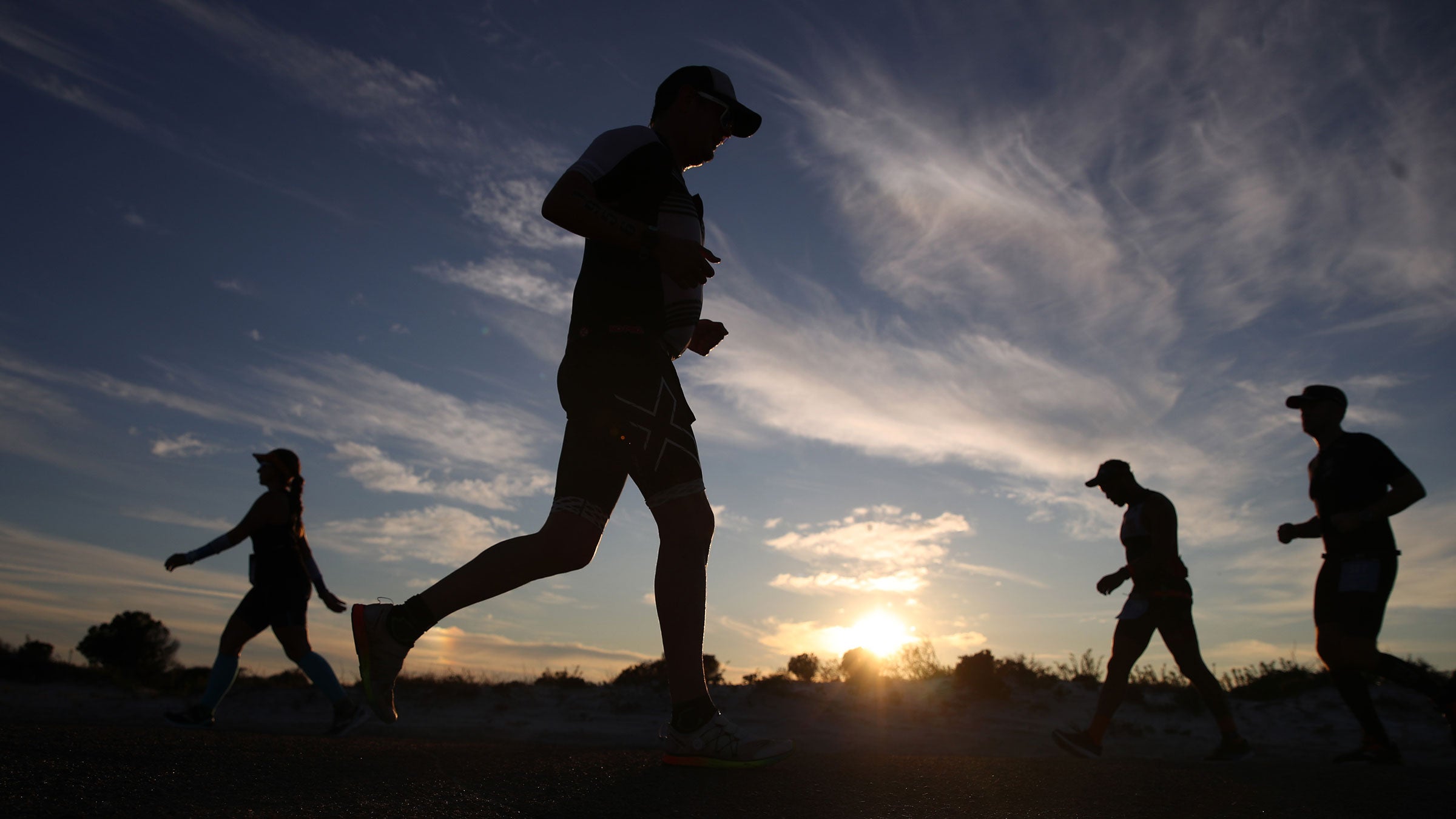The Psychology Of Training For A Race That Might Not Happen

Athletes compete at the 2019 Ironman Florida triathlon. As of this publication date, the 2020 Ironman Florida is still on the schedule. (Photo: Gregory Shamus/Getty Images)
Looking ahead to 2020, Billy LaGreca was stoked. It would be his last year in the 25-29 age group, and his wife was pregnant—this was going to be the year he made it to the Ironman World Championships in Kona. He was all in with a new bike and two half-Ironmans on the schedule leading up to a full.
But as COVID-19 spread, he couldn’t ignore the drumbeat of news, races being canceled one after another.
“It was always in the back of my head that the next race wasn’t going to happen,” said LaGreca, a personal trainer at Traverse Fitness in Denver. “I’d have a four-hour ride on the schedule, and cut it to three. That uncertainty bled over into my nutrition—I wasn’t eating right, and that, again, affected my training. It was all connected.”
LaGreca was not alone. Uncertainty derailed athletes’ motivation to train even before their events were canceled, and that atmosphere of uncertainty remains going forward. That uncertainty is perhaps further exacerbated by the fact that some races are now hoping to go on as planned. While the beginning of the pandemic saw events being canceled months out from race day, now the decision to put on an event is based on day-to-day assessments. In 2021, races were poised to make a comeback – and then the fast-spreading Delta variant hit. Even major, long-awaited events, like the 2021 Ironman 70.3 World Championships, have had to make major adjustments due to ongoing COVID-19 travel restrictions.
How long will this uncertainty go on? Well, that’s another thing we don’t know. Like many aspects of the pandemic, it’s best to think of uncertainty as a permanent fixture, and develop ways of managing its negative effect on motivation.
“To stay motivated to train for events that may not happen, athletes need to get back to what they love or value about the sport, aside from competition,” said Tommy Fritze, a sport psychologist with Premier Sport Psychology. “Whether that’s the camaraderie of training partners, favorite running routes, the flow of a long swim, or feeling very fit.”
Considering triathlon doesn’t really exist as a recreational activity, and most of its participants are driven, type-A people who are in it for the competition, that’s a big ask. And Fritze acknowledged that.
“If competition is everything for you, now is a good time to get to know a different aspect of the sport,” he said. “If you can fall in love with feet on pavement, for example, it won’t feel so painful if the race is canceled. It becomes, ‘Our honeymoon got canceled but we’re still in love.’”
He also pointed out ways of getting that hit of competitive adrenalin that are not race-dependent. “Set a goal for your brick session, and go for it. Or focus on finishing a workout really strong—practicing your kick will bring out that competitive spirit,” he said.
LaGreca realized negative thoughts were short-circuiting his motivation and his training, so he doubled down on his weekly schedule. “I started prepping all my meals for the whole week, and blocking out training time every day at the beginning of the week,” he said. “If everything’s planned and ready to go and the time is there, you have no excuse.”
In fact, according to Fritze, that was a pretty smart thing to do. “Living the life of an athlete might be one of the things triathletes enjoy most about the sport,” he said, from his experience with both pros and age-groupers. “Following a plan, eating right, training right. If that’s the case, maintaining training might be its own reward.”
While having a Plan B seems pragmatic, Fritze put a caveat on that: “When you think about your Plan B, does that feel uplifting or does it feel demoralizing? If it’s exciting and helps you keep training, fine. But if it feels like a sad consolation prize, then don’t spend time thinking about that.”
Love of the tri life, love of being outdoors, time spent with training partners—those can help with the big picture, motivation on a macro scale. Micro-level, when you’re actually out on a run and your mind wanders to ‘what if,’ Fritze suggested consciously redirecting your thoughts to the here and now. “Stay focused on cadence or heart rate or running form, on doing your best with that workout,” he said.
Like everyone, LaGreca is already having to put those motivation-boosting tricks into practice. Eventually, all three of the races on his 2020 schedule were canceled or postponed long-term, but he’s got a plan to keep his motivation rolling—he’s signed up for a virtual race, and is busy organizing an Everesting challenge for the Traverse community.